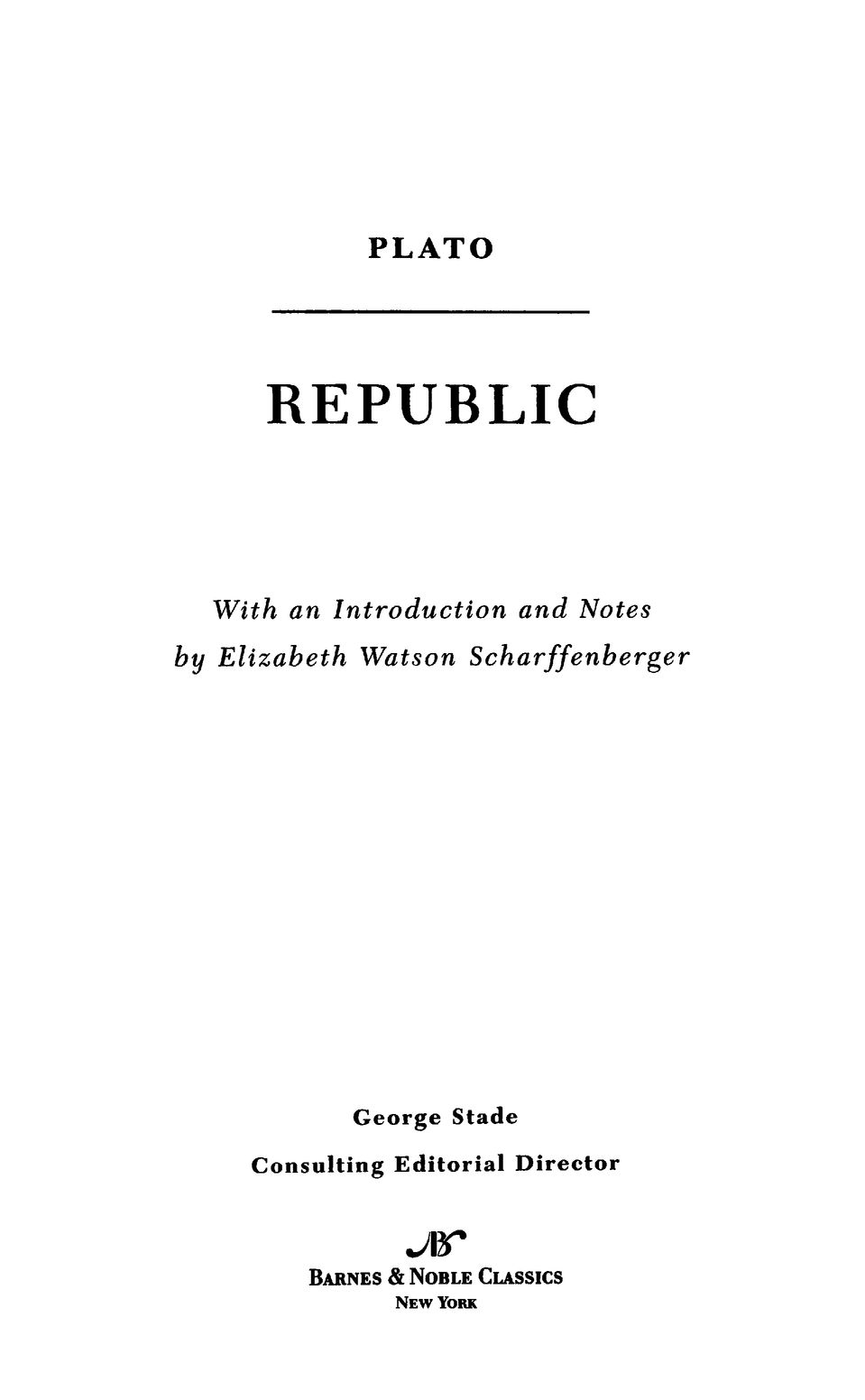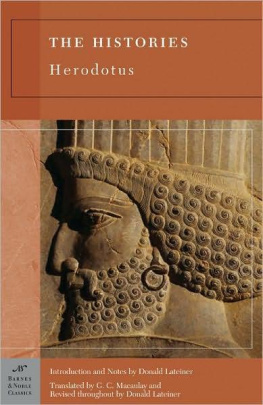
Table of Contents
FROM THE PAGES OFREPUBLIC
... but as concerning justice, what is it?to speak the truth and pay your debtsno more than this? And even to this are there not exceptions? (1.331c)
Is the attempt to determine the way of mans life so small a matter in your eyesto determine how life may be passed by each one of us to the greatest advantage? (1.344d)
For my own part I openly declare that I am not convinced, and that I do not believe injustice to be more gainful than justice, even if uncontrolled and allowed to have free play. (1.345a)
I propose therefore that we inquire into the nature of justice and injustice, first as they appear in the State, and secondly in the individual, proceeding from the greater to the lesser and comparing them. (2.368e369a)
... I am myself reminded that we are not all alike; there are diversities of nature among us which are adapted to different occupations. (2.370ab)
Then it will be our duty to select, if we can, natures which are fitted for the task of guarding the city? (2.374e)
But in reality justice was such as we were describing, being concerned, however, not with the outward man, but with the inward, which is the true self and concernment of man: for the just man does not permit the several elements within him to interfere with one another, or any of them to do the work of the othershe sets in order his own inner life, and is his own master and his own law, and at peace within himself ... (4.443cd)
Until philosophers are kings, or the kings and princes of this world have the spirit and power of philosophy, and political greatness and wisdom meet in one, and those commoner natures who pursue either to the exclusion of the other are compelled to stand aside, cities will never have rest from their evilsno, nor the human race, as I believeand then only will this our State have a possibility of life and behold the light of day. (5.473de)
... for you have often been told that the idea of good is the highest knowledge, and that all other things become useful and advantageous only by their use of this. (6.505a)
You have shown me a strange image, and they are strange prisoners.Like ourselves, I replied; and they see only their own shadows, or the shadows of one another, which the fire throws on the opposite wall of the cave. (7.515a)
He who is the real tyrant, whatever men may think, is the real slave, and is obliged to practise the greatest adulation and servility, and to be the flatterer of the vilest of mankind. He has desires which he is utterly unable to satisfy, and has more wants than anyone, and is truly poor, if you know how to inspect the whole soul of him: all his life long he is beset with fear and is full of convulsions and distractions, even as the State he resembles: and surely the resemblance holds ... (9.579de)
These, then, are the prizes and rewards and gifts which are bestowed upon the just by gods and men in this present life, in addition to the other good things which justice of herself provides ... And yet, I said, all these are as nothing either in number or greatness in comparison with those other recompenses which await both just and unjust after death. ( 10.613e614a)

PLATO
Plato was born into a wealthy, aristocratic Athenian family in 428 or 427 B.C.E., and he lived until 348 or 347. He had kinship ties on both sides of his family with many prominent men in Athens. His father, Ariston, died when he was a child, and his mother, Perictione, was subsequently married to Pyrilampes. Plato was raised in Pyrilampes household along with his older brothers (Glaucon and Adeimantus), a stepbrother (Demos), and a half-brother (Antiphon). As young men, Plato and his brothers were close to Socrates.
Platos familial connections and wealth would have made it easy for him to embark on a political career in Athens. But he did not become politically active, perhaps because he became disillusioned with politics after witnessing, first, the brutal oligarchic regime of the Thirty Tyrants, who seized control of Athens at the end of the Peloponnesian War in 404 B.C.E., and then the execution of Socrates, who was condemned to die in 399 under the restored democratic government for not recognizing the gods recognized by the city and corrupting the youth.
Plato traveled in the years after Socrates death, and he almost certainly spent time in Megara (near Corinth) and Syracuse (on Sicily). He became close friends with Dion, a kinsman of the tyrant of Syracuse, Dionysius I. Plato probably traveled to Syracuse three times during the period from the early 380s to the late 360s. He and Dion evidently planned to educate the tyrants son, Dionysius II, in the hopes that, upon succeeding his father, he would put into practice the political ideals they cherished. But these hopes were never fulfilled. Upon taking power in the early 360s, Dionysius II broke with both his kinsman and his tutor.
In the early 380s, Plato began teaching what he called philosophy at a place near the grove of the hero Academus on the outskirts of Athens. The school came to be called the Academy because of its location, and Plato remained at its head until his death, when his nephew Speusippus took over its administration. After Platos death, the Academy continued to be an important center of research and study for many centuries, attracting students from all over the Mediterranean world.
Plato probably started to compose dialogues before he established the Academy. All but a few of his dialogues feature Socrates as the main interlocutor, and most are peopled with figures who would have been well known, especially in Athens elite circles, during the fifth century. A large body of writing attributed to Plato survives from antiquity, including Apology (a recreation of Socrates defense speech), numerous dialogues, and a series of letters. Most of these works are considered to be truly by Plato, although the authenticity of some texts (including some of the letters and a handful of dialogues) has been doubted at various points in the last 2,400 years.
THE WORLD OF PLATO AND REPUBLIC
| 508 | Cleisthenes, son of Megacles, introduced sweeping polit |
| B.C.E. | ical reforms to the Athenian constitution, marking the beginning of democratic government in Athens. |
| 490 | At the battle of Marathon (26.3 miles from Athens in At tica), Greek land forces, under the command of the Athe nian Miltiades, son of Cimon, defeated an invading army of Persians. Most of the Greek troops who fought at Marathon came from Athens. |
| 480 | At the battle of Thermopylae (a mountain pass in northeast ern Greece), Persian land forces fought against elite Spartan soldiers under the command of Leonidas, one of the Spar tan kings. The entire Spartan force was killed in the battle. |
| 480 | At the battle of Salamis (an island near the port city Piraeus in Attica), Greek naval forces, under the leadership of the Athenian Themistocles, son of Neocles, defeated the Persian navy. |
| 479 | In the battle of Plataea (in Boeotia), Greek land forces deci sively defeated the Persian army, which subsequently with drew from Greece. Under the leadership of the Spartans and then the Athenians, city-states in Greece banded to gether in the fight to free Hellenic city-states on the coast of Asia Minor from Persian dominion. This alliance was soon called the Delian League, because its treasury was kept on the sacred island of Delos; it eventually came un der the total control of the Athenians. |







